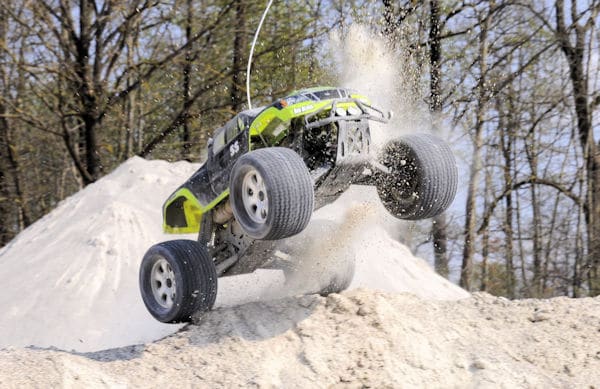Remote Control Trucks

Nowadays, RC trucks are incredibly prevalent both as toys for children (toy-grade) and toys for adults (hobby-grade). RC trucks are often lumped in with RC cars, but they actually vary greatly in the ways that they are built, sold, and run. These radio-controlled vehicles are often made as monster trucks, but like all radio controlled vehicles, they can be created in all different types of trucks—from commercial vehicles to common pickups. Some popular brands for RC Trucks specifically are Traxxas, Losi, and Redcat Racing.
Beyond the different grades of trucks, there are many different styles. For example, there are short course trucks, monster trucks, rock crawlers, and semi trucks. If you are looking for a good RC semi truck, be sure to take a look at our list of the best RC Semi trucks.
In order to give a better understanding of how to choose which type of RC truck to purchase, we have broken things down into some simple categories that may prove important when considering what type of RC truck one wants to add to their collection. If you want an intermediate level RC truck, make sure to check out our post best RC truck under $100.
Toy-Grade vs. Hobby-Grade
One of the most important choices when looking at radio controlled vehicles is the choice between toy and hobby grade vehicles. This dictates the quality as well as the price of the RC truck that a person will be receiving. The distinction between the two types of RC trucks essentially comes down to whether the truck will be used for play as with a child, or is the belonging of a hobbyist who will not be as rough on the truck. Toy grade RC Trucks are built to be cheap and disposable, as they are meant to be toys that a child can play with. Hobby grade RC trucks are collectibles, and they come equipped with motors that run more like the motors of the cars that they are scale models of.
However, outside of price and function, the primary difference between toy and hobby-grade RC trucks is that hobby-grade trucks are meant to be taken apart, reworked, and built upon. Toy-grade RC trucks do not come equipped with this capability. Most hobbyists will say that comparing toy-grade and hobby-grade RC trucks is the equivalent of going to a gun fight wielding a nerf gun—they are two separate entities and the two actually rarely cross paths. So, for hobbyists, it is always wise to invest in a hobby-grade RC truck if they expect to get anything out of it.
How It Works
Radio controlled trucks are an amazing feat, especially considering how long they have been around for. All radio-controlled vehicles come equipped with four parts that are essential to their function, and these are the receiver, transmitter, motor, and power source.
• Transmitter: The transmitter is the hand-held part of the RC truck, and it sends radio waves to the receiver.
• Receiver: This component receives the signals and translates it into directions for the motor to follow. Most RC vehicles operate at a frequency of either 27 or 49 MHz, which determines the distance the vehicle can travel from the transmitter without losing the signal.
• Motor: The motor turns the wheels, accelerates, and decelerates. The motor functions come with the aid of the power source.
• Power Source: For RC trucks, there is always one of two options—electric or nitro. The choice of which power source to use depends on user preference, although all of them have their pros and cons.
Electric or Nitro?
While electric RC trucks are typically the most popular type, different collectors have varying preferences in which power source to use with their radio controlled trucks. There is a long-standing debate among those who collect radio controlled vehicles as to which method of power is the best, but in the end, it really comes down to personal preference. While some types of RC vehicles have more limited options for the type of power they can use, RC trucks can run on either nitro or electric.
People who prefer nitro vehicles often like them for several reasons, one of which being the smell that comes from the engine of a running RC truck. Nitro-run vehicles more accurately emulate the scent of running an actual truck. Another plus-side to using a nitro-powered vehicle is that the fuel can be changed while the vehicle is running, whereas an electric-powered truck must be powered off and recharged when the power source dies. Nitro engines have become something romantic for RC truck drivers. It is not always the simplest structure to work with, but it is classic. For some, the classic appeal is an essential part of the hobby. Hobbyists also enjoy the challenge that tuning a nitro-run engine can present.
For others, however, this tune-up issue is exactly why they prefer an electric-run RC truck. RC trucks that run on electricity are often simpler to maintain and can sometimes run faster than nitro-run trucks. Electric trucks are also cleaner and quieter than nitro trucks. Those that drive electric RC trucks are often less interested in the process of tuning their RC vehicle than those that drive nitro. For the electric drivers, the enjoyment comes more out of driving the car without having to tune it up as often. Some also prefer the torque of electric motors over nitro, although others will say that they’re comparable.
What Else to Look for When Buying
When purchasing a radio-controlled truck, there are a lot of factors to consider. As these are often investment pieces for a collection, it is important to consider all factors before making a purchase, because it will more than likely cost a pretty penny.
Aside from the power source, which is discussed above, a few factors to think about when looking into RC trucks are scale, type of vehicle, and condition in which to purchase (built, partially built, or unbuilt). These three things will determine exactly what one can do with the RC truck, what class one can race it in, and the amount of labor that will have to be put into the truck before it is driveable.
